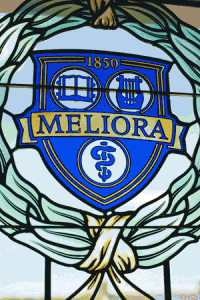
Courtesy of rochester.edu
The Rochester Center for Community Leadership (RCCL) has launched a new scholarship program — Meliora Leaders — to fund undergraduates in service positions in the Rochester community.
Ten UR students will be selected for the inaugural 2012-13 academic year and will receive $2,350 toward educational expenses at UR in exchange for performing at least 300 hours of service in the community, a portion of which will include leadership and civic engagement training.
According to Director of RCCL Glenn Cerosaletti, the impetus for the program came from a conference he attended several years ago, during which he was inspired by the Ford Foundation Fellowship Program — a “very impressive” program of community service work that he thought would be “very cool to have at UR.”
Cerosaletti also said some of the motivation for the program was garnered from the success of the Rochester Urban Fellows Program and the Rochester Youth Year program.
Urban Fellows, which offers stipends for summer work in civic engagement to undergraduates attending a Rochester-area college and Rochester residents who attend college elsewhere, started 10 years ago and has been very successful, according to Cerosaletti.
“In talking with [Dean of Students Matthew] Burns, I started thinking that it would be great to have a program that would allow students to expand their commitment to the community throughout the academic year and to expand what they did in the summer with the Urban Fellows Program,” Cerosaletti said. “We saw this as an opportunity to provide incentives for students who wish to extend and deepen their engagement with the community.”
A funding opportunity then presented itself through New York Campus Compact — a national organization based at Cornell University that seeks to support the civic mission of higher education at colleges and universities throughout the country.
Through this setup, $1,175 will be provided by the U.S. Corporation for National and Community Service in the form of an AmeriCorps Education Award. The UR Financial Aid Office will then match this amount, such that students selected as Meliora Leaders will receive $2,350 to use toward educational expenses.
The scholarship opportunity was officially announced on April 2, with the deadline for applications set for April 23. Because several students approached Cerosaletti — who said he wished he had announced the program earlier than he did — to request more time for thE application process, Cerosaletti decided to extend the deadline to Monday, May 1.
“The sense that I’m getting is that there is quite a bit of buzz anD excitement,” Cerosaletti said, adding that he believes the program will be competitive this year and that, while funding for coming years is not set in stone, he is optimistic that the program will evolve and continue at UR in coming years.
While students are free to propose their own topic, program guidelines stipulate that projects should be “predominantly focused on direct service (providing service directly to those in need), but may also include some indirect service components (expanding the capacity of an organization to provide services through research, fundraising, publicity, etc.),” according to the RCCL website. The website also states that preference will be given to service projects in the areas of job development and placement or after-school programs and to projects that “promise to involve other students in the community, in addition to the Meliora Leader.”
Students who have already participated in leadership training through initiatives such as the Paychex Leadership Institute, Compass to Personal Success or the Rochester Urban Fellows program will also receive priority.
Cerosaletti said the focus on projects supporting youth makes is a logical extension of the “huge need” for these services in Rochester — child poverty rates in the city stand at over 40 percent. Much of the focus on these projects is a logical result of the college student demographic, Cerosaletti believes.
“Students want that sort of connection from mentoring youth in the community and planning careers with youth,” he said.
“Research suggests that mentoring itself is a valuable exercise in leadership development so there’s definitely something to be said for what undergraduates have to gain from mentoring relationships in the community.”
But Cerosaletti believes these civic engagement projects serve the community as much as they serve undergraduates.
“I view our engagement as reciprocal,” he said. “Undergraduates stand to gain as much as youth, adults, community members.”
For more information about applying to the Meliora Leaders program, visit www.rochester.edu/college/rccl/meliora.
Buletti is a member of the class of 2013.
